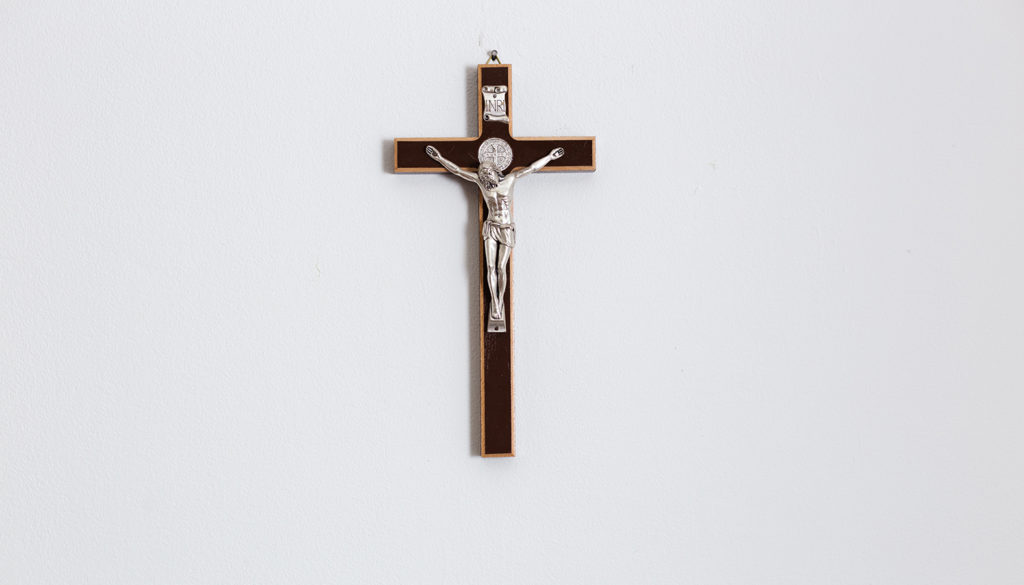Back in 2000, when I was diagnosed with breast cancer, I went right away to a trusted LA priest.
“Illness causes a fundamental change in identity,” Father Terry pointed out, “just as stopping drinking does, so of course that feels scary.” He wasn’t about to come out next and say, “Join the club, you’re not the only sick person in the world,” or, “You can be of service even when you’re dying,” or, “You wouldn’t believe the joy and faith with which I’ve seen people walk through illnesses 10 times worse than what it looks like you’ve got.” He wasn’t about to say, “Offer it up.”
Instead, he told a story. He told about a friend of his, an advertising executive who’d been at St. John’s Hospital in Santa Monica for a couple of years before dying of cancer. Once, when Terry was visiting, the guy had started talking, then trailed off and said, “I can't remember the ends of things any more. I can barely even pray. I just look over there” — he pointed to the crucifix that was hanging on the wall — “and sort of throw the names of my friends at it.”
In “The Shattering of Loneliness: On Christian Remembrance” (Bloomsbury Continuum, $16), Norwegian bishop and monk Erik Varden takes the same tack.
He sets up the human condition in all its existential starkness. And then he points us to poets, memoirists, novelists, composers, and visual artists. He showcases Gospel parables and the life of Christ. He tells stories.
He speaks of the Crucifixion, of our horror of evil, and of our duty not to numb ourselves but to remember: “a communion of remembrance that transcends time and extends beyond death’s frontier.
Then he points to a memoir called “The Woman Who Could Not Die,” whose author, Julia de Beausobre, was a survivor of the Stalinist labor camps.
“While de Beausobre was engulfed in Stalin’s terror,” Varden writes, “she encountered an old nun who assured her she must one day leave Russia and convey a message to ‘our brethren beyond the border.’
“She must make it clear to them ‘that they should keep burning on the altars of their hearts the flame that is tortured out of ours. If only some of them keep it burning, we will find it in our prayers, in our sleep and in our flight away from our tormented bodies. It will shine to us as a glowing beacon of light in the numbing darkness, and we shall be comforted and Christ shall rejoice.’ ”
He speaks of the tension in which we are called to live: “the tension between what he is and what he is called to become; the tension between natural life and life defined by God’s promise.”
Then he points us to Andreï Makine, a writer, not Catholic, who “grew up in Siberia, but has lived in Paris, in a state of complex homelessness, since 1987, and whose work is animated by a like tension.” Makine’s novels — “A Life’s Music;” “The Woman Who Waited;” “Brief Loves that Live Forever” — offer intimate encounters with time, the reality of suffering, life and death.
He tells the powerful story of Maïti Girtanner (1922-2014), a young pianist who worked for the French Resistance. Music was her passion, her life. She was arrested, taken to a house with other prisoners, and for four months was tortured by the Nazis. A doctor had developed a method that consisted of repeated cudgeling at the base of the spine. Girtanner survived but her vocation as a pianist was decimated. Her nervous system was ruined and she lived in chronic pain for the rest of her life.
Yet she was determined to avoid allowing the trauma to dictate her inner life. Forty years later, facing death, her torturer contacted her and asked forgiveness. “When he bowed down to her (in great pain that day, she was reclining on a couch), she took his head between her hands and kissed him on the forehead. It was a gesture, she later insisted, that was unpremeditated but ‘couldn’t not have been.’ ”
In the Afterword, Varden dedicates his book to the memory of Father Michael Kayal, an Armenian Catholic priest from Aleppo who, after faithfully serving the poor, was abducted by armed rebels on Feb. 9, 2013, and has not been heard from since.
He then describes a fresco by the French artist Arcabas (1926-2018) from Saint-Hugues de Chartreuse called “The Pilgrims of Emmaus,” a detail of which graces the cover of “The Shattering of Loneliness.”
“Arcabas calls something essential to our attention. God remembers us before we remember God. Christ seeks the wanderers out when they, for their part, have despaired of finding him. He hears their anguish as a silent call. In a moment, he will hold the bread of mourning up as a Eucharistic host. Behind the pilgrim on the right sits a fourth person, whose profile is concealed. I take that to be me — or you. We are invited to sit down and share our story, assured that we have never been out of God’s mind. The old has passed. The new has come. There is a golden shimmer of glory to things.”

